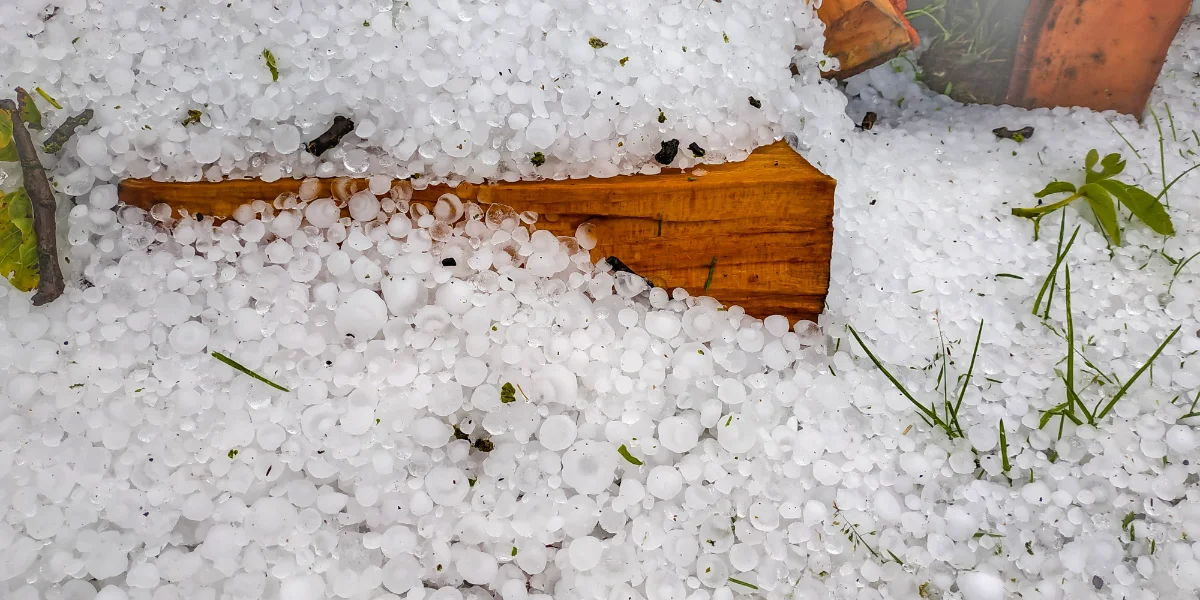44
Preparing For Storms & Dealing With Hail Damage

Things to pay attention to when you are expecting inclement weather, and how to handle the aftermath once the storm has passed.
Spring and Summer storms in North Texas are no joke. Storms like the ones that have recently hit Flower Mound, Highland Village, Roanoke, and Argyle pop up with little to no warning and can wreak havoc on your swimming pool and your backyard. From heavy rain to hail and tornadoes, there are several ways your swimming pool can be damaged or negatively affected by the weather here in North Texas. The following are some things to pay attention to when you are expecting inclement weather, and how to handle the aftermath once the storm has passed.
Drainage
Adequate drainage is extremely important during Texas rainstorms, which frequently dump extraordinary amounts of precipitation in small amounts of time. Check the deck drains around the pool to ensure there are no obstructions. Clogged drains will increase the likelihood that water will drain into your pool. Additionally, keep an eye on your backyard and swimming pool area during storms. Poor drainage will typically be most identifiable during a severe storm. If you notice water frequently draining into your pool during rainstorms, it is important to look into improving the drainage in your yard. If your pool has flooded, check out our article, Pool Care After a Flood, for instructions on how to begin clearing it up.
High Wind and Lightning
Tornadoes and high winds are always a risk when dealing with severe weather in North Texas. Make sure that any tables, chairs, umbrellas, or grills, are secured and stored in a safe place. The last place you want your furniture or your grill to end up is in your swimming pool. Additionally, if you are expecting a severe electrical thunderstorm, consider shutting power off at your swimming pool equipment pad to protect your pool’s electrical components from possible power surges.
Hail
Hail can be a menace to your swimming pool and equipment much like it is to your roof and your vehicles. Ensure that no valuable furniture or outdoor fixtures are exposed. If you have a robotic cleaner on a caddy outside, make sure to move it under a covered area. If your equipment pad is exposed and you are expecting severe hail it may be a good idea to turn your equipment off. You don’t want your pump to be running if your plumbing or your filter tank is broken by the hail. Once the storm has passed be sure to evaluate your equipment pad and your deck area for damage. Some of the common equipment components hail can damage are your plumbing, filter tank, heater tops, and skimmer lids. If you notice any serious damage or leaks in your equipment area, it is best to keep your equipment off and have it evaluated for repair as soon as possible. Large hail stones like those that recently fell in the Flower Mound area can even damage your deck and coping, so be sure to check around your pool for damage as well.
Debris
Wind and drainage issues can introduce large amounts of debris into the pool during a storm. Not only is debris unsightly, but it also has a negative effect on your water chemistry. After the storm is over, be sure to empty your skimmer baskets, automatic cleaner bag or canister, and skim any floating debris off the surface of your pool. It may also be helpful to extend your pump and your automatic cleaner runtime after the storm to pick up and filter out as much debris as possible. You may also need to vacuum the pool to remove finer debris from the pool’s bottom. The debris may put added strain on your filter – be sure to backwash/clean the filter as needed.
Water Chemistry
If the forecast is indicating severe weather, thunderstorms, or heavy rain in your area, it is always a good idea to make sure your pH is balanced and that you have plenty of chlorine in your pool. While heavy precipitation will always have some effect on your water chemistry, a pool with plenty of chlorine will generally fare better in bad weather than one with not enough. However, high winds and torrential downpours can have a detrimental effect even on pools with excellent water chemistry. It is particularly important to test your water as soon as the rain has passed. Make sure your pH is balanced and super chlorinate the pool.
While all these steps can help protect your swimming pool from severe weather conditions, some damage is not always preventable. If you have recently had severe weather damage to your pool, Gohlke Pools can help. Our retail store in Denton is staffed with water chemistry experts and stocked with all the pool supplies you will need to clear up your pool after a severe storm. If you need help with pool maintenance or repair after a storm, our Service and Renovation departments can help remedy any weather-related damage to your pool or outdoor living area. Feel free to contact us for a free estimate on any of your pool maintenance or repair needs.




